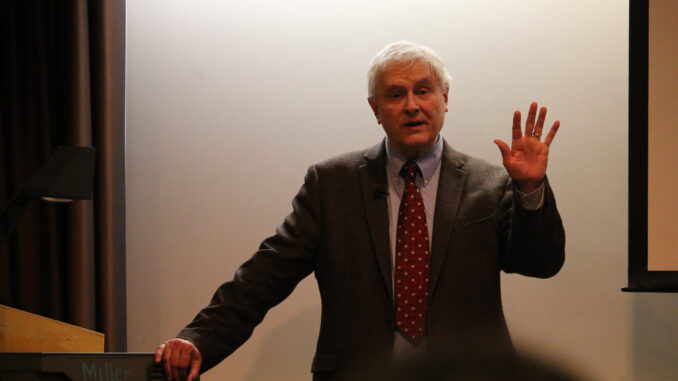
University of British Colombia professor speaks on twentieth century China, confucionist thought
On Feb. 20, the Lewis & Clark History Department invited Professor Timothy Cheek to the college for the annual Throckmorton Lecture. Cheek currently teaches at the School of Public Policy and Department of History at the University of British Columbia. His research interest is in 20th-century Chinese history, Chinese Communist Party (CCP) history and the role of intellectuals in public life in China.
The Throckmorton lecture is an annual lecture held by the History Department since 1964 to commemorate the academic spirit of former Professor of History Arthur L. Throckmorton, who died suddenly in December 1962. The History Department has invited some of the most recognized historians to the LC campus since the lecture’s conception.
Administrative Coordinator for the English & History Department Amy Baskin took part in organizing this year’s Throckmorton lecture. Baskin said Cheek’s lecture gives a sense of the current events related to China.
“In order to have a sense of current events and what the Chinese government is like now, to look at the past to explain the present and help interpret it,” Baskins said. “The history of Confucianism in China is going to influence the way the Chinese Government is run, but how much, to what degree, why, and where.”
Cheek intended to shed light on how China is governed and how its rule by Xi Jinping since 2012 challenges liberal hegemony and raises fear in many Americans. The lecture attempted to pin down the CCP’s current governance has ties to its Confucianist history.
The beginning of the lecture starts with Cheek giving a brief rundown of 1,000 years of Chinese history to explain how China is governed. Cheek then explored the components of the past Confucian practices, including local, public education and pacific virtue. One example of this that Cheek elaborates on throughout his lecture is “community compacts,” an attempt to work as local self-help that creates ideal subjects in Chinese villages that began in Confucianism of the early eleventh century. Cheek compared the “community compacts” to dormitory housing.
“In the 1930s, something of the spirit of the community compacts reemerged in a communist ideological revolting campaign, what we know as brainwashing. It reappeared once again in a political study session in Xi Jinping China today,” Cheek said. “By the mid- twentieth century, this transformed into an ideological revolt by the CCP. This is called Jiaohua.”
Jiaohua is the Mandarin Chinese word for transformational teaching. Cheek told the audience that it was the one word he wanted them to remember following the lecture. The essence of Jiaohua carries on from the dynastical history of China up until now with the leadership of the CCP.
The community compacts function for rural administration under an elite dynasty because local village life was not as strong as elite government. In the compacts, neo- Confucianism was practiced as a way to better themselves and morally revive the spirit of the villagers.
History student Ethan Tolpin ’23 is excited that the Throckmorton made a return following the pandemic and was interested in the aspect that one of the Chinese characters is democracy.
“The way we think about China is so far from a democracy, so it was really interesting to hear that one of the tenets of being a good socialist promoted by the CCP and Xi Jinping is democracy,” Tolpin said.
Mateo Kaiser ’23, a history major, said that though in his studies, he does not focus on Chinese history, he still found a lot of use in attending the lecture.
“China is just totally outside of my realm of historical knowledge,” Kaiser said. “But it was interesting to see, on one hand, how much of a philosophical underpinning Chinese government has had throughout history, like this is really, really rooted in this philosophical background of Confucianism.”
Kaiser also said he is looking forward to applying what he learned in the lecture to his studies now, in terms of modern ideological roots.
“I’m taking a social theory class and … we’ve been talking about, what are the ideological underpinnings of modernity? What are the critiques of modernity?” Kaiser said. “And seeing this, (what does) the Confucian philosophy say of government?”
Subscribe to the Mossy Log Newsletter
Stay up to date with the goings-on at Lewis & Clark! Get the top stories or your favorite section delivered to your inbox whenever we release a new issue.

Leave a Reply